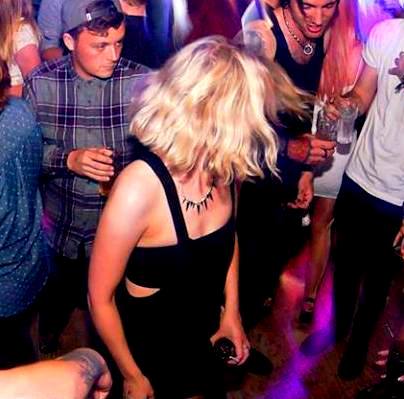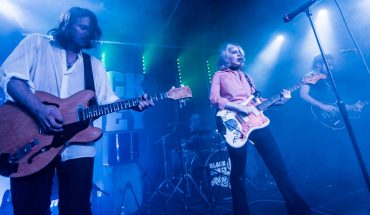King Charles is set to release his second album ‘Gamble For A Rose’ on 22ndn January 2016, through Buffalo Gang via Kobalt Label Services. King Charles is a different person to the one who released extraordinary debut album ‘Loveblood’ in 2012. Not only has his appearance changed, his long dreads cut perhaps as a symbol of the move away from his old persona to a new more mature Charles, but his music and outlook are underpinned by a need to return to find the root of his musical passion, the reason he started playing, and that all started with friends.
Last year Charles took on his biggest tour to date, a 28 nights in 28 days extravaganza that would have broken a lesser individual, but ended in triumph as he headlined the London Forum. Emboldened, one of the first things he said to his friend Marcus Mumford was “I want to make the album I should have made five years ago.” So, Charles and Marcus began demoing songs, declaring the whole idea of the project to be “music to my ears”, Marcus said he would produce it and they decamped to a farm near Exeter to begin working up the songs, with mattresses pushed up against the walls to make vocal booths and old friends to jam with including Charlie Fink and Tom Hobden (Noah and the Whale) and Winston Marshall (Mumford & Sons).
The first song to be unveiled from ‘Gamble For A Rose’ is the album opener ‘Loose Change For A Boatman’, a passionate love song (“You say your love for me has waned from the storm, Your passions have fallen from the days of old, If ever you loved me, If ever at all, Our souls are tied.”), which builds and builds before exploding into riotous, arena-leveling colour. We sat down with King Charles to discuss his busy 2015, his famous friends and why Bob Dylan is one of his biggest influences.
Hello King Charles, how are you?
Feeling fine, thanks.
Back in February 2015, you performed 28 shows in 28 nights. How long did it take for your voice/body to recover from this full-on schedule? Or did you survive unscathed?
I would have liked to have kept going, but I think I would have been unrecognisable after too many more shows. So far my voice has been robust, but I do want to push myself a bit further. It’s what I love doing, and I always feel cheated when a tour ends.
You’ve recently performed at the O2 arena supporting Mumford & Sons – how did that go?
Pretty cool experience, I’ve always wanted to play that stage, the sound is huge there.
Marcus Mumford produced your new album Gamble For a Rose is released in January (the 22nd). How important do you think it is to work with like-minded musicians? Does it make it easier to overcome any recording/writing challenges?
It’s important to me to have a producer who can challenge the way you see your own songs. I think there are always things hidden in songs that need to be dug out. We were all on the same page as to the direction we wanted to go in, but all the musicians added something fresh which brought the songs to life.
Gamble For a Rose is the follow up to your first album Loveblood (2012). Can you talk me through any major differences between the two records, and explain how your sound has progressed since 2012?
I wanted to go back to my roots with this album, to all the sounds that first inspired me to make music and write songs. It was at a stage before Loveblood that was very important to me, but got missed out. I felt like I needed to revisit this stage in my life to remind me who I was as a songwriter. I learned a lot from making Loveblood and took a lot of those ideas to the new record, but I think the sounds are fundamentally different.
Many of your songs are acute, passionate observations about love – particularly new track ‘Animal Desires’. Do you think it’s important for artists to remain emotionally tender in order to keep writing innovative music? Or can emotional distance sometimes help?
There are a few different stages to making music. In the early stages it’s important for artists to be vulnerable to their feelings, because that is where I think the journey of creation starts. There are subsequent stages that are less emotionally driven that are more about shaping what comes out of that journey. It’s easy to feel at the mercy of your emotions, but it’s good to be in control and let things go that aren’t helping the process.
‘Choke’ is my favourite track on the new album. What was the writing and recording process behind this song?
Wrote this one with Marcus in his garage, it came out of nowhere really. There wasn’t any pressure to come up with new stuff so we just played around with new ideas and ‘Choke’ is what came out of it. The recording was similar I think.
You cite Bob Dylan as one of your biggest influences. Some of Dylan’s most famous songs – ‘Blowin’ In The Wind’ and ‘The Times They Are a-Changin” – became anthems for the American civil rights and anti-war movements. On Gamble For a Rose’s opening track ‘Loose Change For The Boatman’, you reference the modern threat of terrorism: “I got stopped at Terminal 4 the other day, they said I looked like a terrorist at play”. Do you think it’s important for musicians to comment on current social issues and try to help influence change, either indirectly or directly?
I like to hear artists being real about what they’re passionate about. I believe that if you’ve got something to say you should say it. The privilege of an artist is having a means to say something.
Are there any artists you could recommend looking out for in 2016?
Not sure, I’ve got some catching up to do.
Finally, on a personal note – I tried to get in to your gig at The Warren at The Great Escape Festival in 2011 – but the queue stretched further than the equator and the venue was already at capacity. What did I miss on this date?
That was a long time ago…
Kate Crudgington
@KCBobCut






